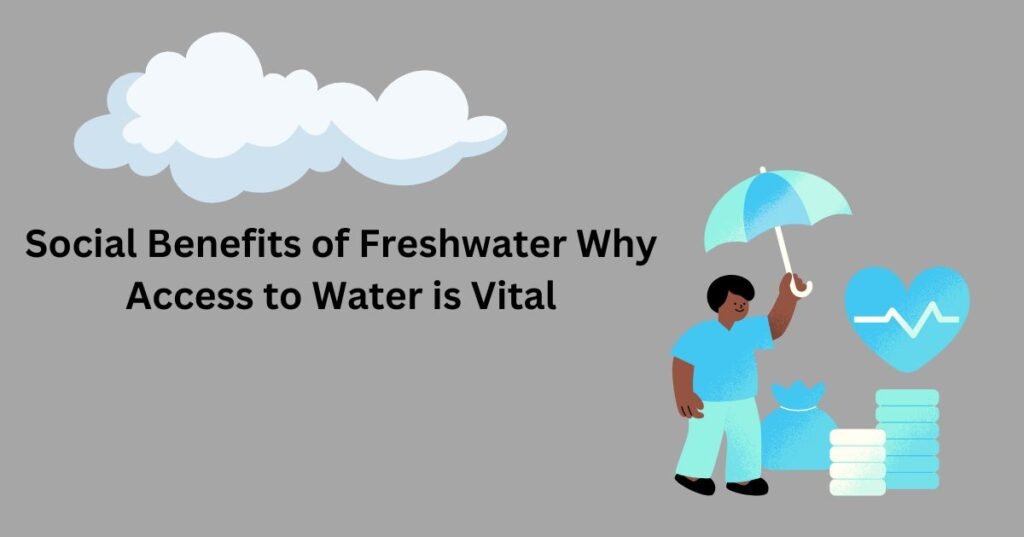Freshwater is one of the most critical resources for human survival, yet many people across the world still lack access to it. The importance of freshwater extends far beyond drinking water, as it plays a vital role in various aspects of social development, from public health to economic prosperity. Access to clean, reliable freshwater offers numerous social benefits that contribute to the well-being and stability of communities. This article explores the multifaceted social benefits of freshwater, highlighting its impact on public health, education, gender equality, economic development, and social stability.
Improved Public Health and Disease Prevention
One of the most significant social benefits of freshwater is its impact on public health. Access to clean water is essential in preventing waterborne diseases such as cholera, dysentery, and typhoid, which thrive in contaminated water sources. Lack of access to safe drinking water can lead to significant health crises, particularly in developing countries, where sanitation infrastructure may be lacking. According to the World Health Organization (WHO), waterborne diseases are a leading cause of morbidity and mortality, particularly among children in underdeveloped regions.
When communities have access to clean water, the incidence of waterborne diseases drops dramatically. Safe drinking water reduces the risks of gastrointestinal infections, dehydration, and malnutrition, which can have long-term health consequences. Furthermore, access to freshwater improves hygiene practices, such as handwashing, bathing, and food sanitation, which are essential for maintaining health and preventing the spread of infectious diseases. As a result, communities with better access to freshwater generally experience better overall health, fewer disease outbreaks, and increased life expectancy.
Supporting Education and Empowering Children
Access to freshwater also has significant social benefits for education. In many rural and impoverished areas, children—especially girls—spend a large portion of their day collecting water from distant sources, which can interfere with their ability to attend school. In regions where water is scarce or difficult to access, children may be tasked with walking long distances to fetch water, often missing out on vital educational opportunities.
When communities have reliable and nearby access to freshwater, children can devote more time to their education. This is particularly impactful for girls, who are often responsible for water collection in many societies. With reduced time spent on gathering water, girls can attend school regularly, pursue academic goals, and improve their future prospects. In this way, access to freshwater directly supports education and enables children to break the cycle of poverty.
Promoting Gender Equality and Empowerment
Access to freshwater has significant implications for gender equality. In many parts of the world, especially in rural areas, women and girls are primarily responsible for fetching water for their households. This task can be incredibly time-consuming, requiring hours each day to collect water from distant wells, rivers, or other sources. This burden often limits women’s and girls’ opportunities for education, employment, and participation in community activities.
When freshwater sources are easily accessible, women are freed from the time-consuming task of water collection. This allows them to engage in other activities, such as income-generating work, educational pursuits, or community leadership. Additionally, access to clean water enables women to take better care of their families’ health, as they are better equipped to manage hygiene and sanitation practices. As a result, access to freshwater can play a pivotal role in promoting gender equality, allowing women to improve their social and economic status while contributing more fully to the development of their communities.
Economic Development and Livelihoods
Freshwater is an essential resource for economic development and supports the livelihoods of millions of people worldwide. One of the primary sectors dependent on freshwater is agriculture, which requires water for irrigation and livestock. Reliable access to freshwater is critical for farmers to produce crops and sustain livestock, ensuring food security and economic stability for their families. In many parts of the world, especially in developing countries, agriculture is the primary source of income, and water scarcity can severely affect agricultural productivity.
In addition to agriculture, freshwater is also vital for industry and energy production. Hydroelectric power, a renewable energy source, relies on freshwater to generate electricity. This energy supports not only industrial activities but also helps power homes, schools, and businesses. Furthermore, access to freshwater supports industries such as manufacturing, mining, and textiles, all of which depend on water for their processes.
Access to freshwater also impacts fisheries and aquaculture, which provide livelihoods for millions of people in coastal and inland communities. Fish farming and freshwater fishing contribute significantly to local economies and provide important sources of nutrition. By supporting these industries, freshwater directly contributes to economic growth, poverty reduction, and the overall prosperity of communities.
Food Security and Nutrition
Freshwater plays a central role in ensuring food security and nutrition for communities. Without adequate access to water, agricultural production becomes unsustainable, leading to reduced crop yields and scarcity of food. Freshwater is required for irrigation, which allows farmers to grow crops even in dry seasons. Without irrigation, crop failure becomes more likely, and food security is threatened.
Freshwater also supports aquaculture, which is a vital source of protein for many communities around the world. Fish farming, particularly in freshwater systems, provides affordable and nutritious food, helping to address malnutrition and food shortages in vulnerable populations. By ensuring a stable supply of freshwater, communities can grow more diverse crops, maintain livestock, and sustain fish populations, all of which contribute to improved nutrition and food security.
Reducing Social Inequality and Promoting Social Justice
The availability of freshwater plays a critical role in reducing social inequality. In many regions, particularly in urban slums and rural areas, access to clean water is limited or non-existent, forcing people to rely on unsafe sources. In such areas, the wealthy often have access to treated, clean water, while the poor must rely on contaminated water sources, increasing their vulnerability to disease.
By ensuring that all communities have equal access to clean and reliable freshwater, social inequalities can be reduced. Governments and organizations that prioritize water accessibility help create a fairer society where all individuals, regardless of their socio-economic status, have the opportunity to live healthy and productive lives. This can also reduce the burden on healthcare systems by preventing waterborne diseases and promoting better overall health in disadvantaged communities.
Promoting Social Stability and Peace
Freshwater plays an important role in maintaining social stability and preventing conflict. Water scarcity is a known driver of social unrest in many regions, particularly in areas where water resources are shared between countries or communities. Disputes over water rights and access can lead to tension, conflict, and even war. Conversely, equitable and sustainable management of freshwater resources can promote peace, cooperation, and mutual understanding.
In areas where water is shared between countries, international treaties and agreements on water use can help prevent conflict. Proper water management can foster cooperation between neighboring nations or communities, ensuring that water is used sustainably and equitably. Thus, freshwater can contribute not only to social development but also to regional stability and peace.
Environmental Sustainability and Community Well-Being
Finally, the sustainable management of freshwater resources contributes to environmental sustainability and the overall well-being of communities. Freshwater ecosystems, such as rivers, lakes, and wetlands, provide essential services, including flood regulation, water purification, and habitat for diverse species of wildlife. These ecosystems also support local economies by attracting tourism and providing resources for fishing and agriculture.
When freshwater resources are managed sustainably, communities benefit from healthier ecosystems, which in turn provide social and economic benefits. For example, wetlands help filter out pollutants from water, ensuring cleaner water for consumption and agriculture. By protecting freshwater ecosystems, societies can maintain a balance between human development and environmental health, ensuring that future generations can continue to enjoy the benefits of freshwater.
Conclusion
Access to freshwater offers an array of social benefits that are critical for the well-being and development of communities worldwide. From improving public health and enabling educational opportunities to promoting economic development, gender equality, and social stability, freshwater is a cornerstone of a healthy, thriving society. However, the global challenge of water scarcity highlights the need for sustainable water management practices to ensure that all individuals, regardless of their location or socio-economic status, have access to this vital resource. As we face growing challenges related to climate change, population growth, and urbanization, securing equitable access to freshwater remains one of the most pressing issues of our time.



